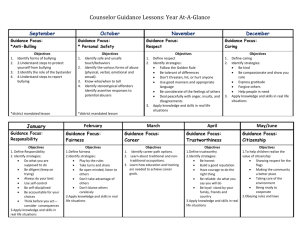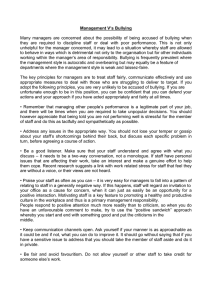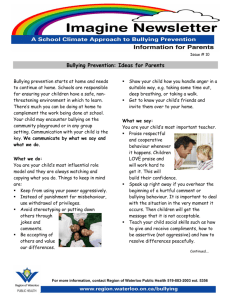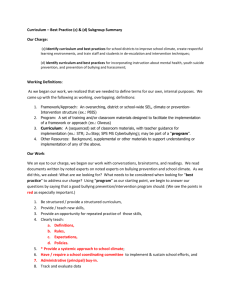Conflicts & Bullying
advertisement
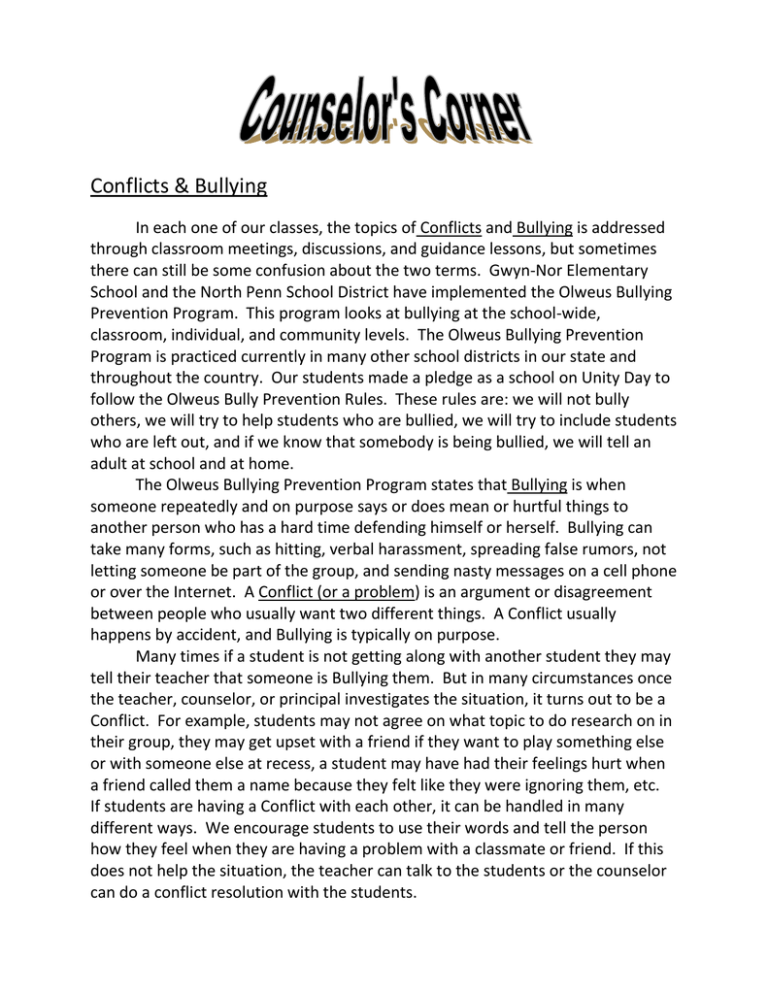
Conflicts & Bullying In each one of our classes, the topics of Conflicts and Bullying is addressed through classroom meetings, discussions, and guidance lessons, but sometimes there can still be some confusion about the two terms. Gwyn-Nor Elementary School and the North Penn School District have implemented the Olweus Bullying Prevention Program. This program looks at bullying at the school-wide, classroom, individual, and community levels. The Olweus Bullying Prevention Program is practiced currently in many other school districts in our state and throughout the country. Our students made a pledge as a school on Unity Day to follow the Olweus Bully Prevention Rules. These rules are: we will not bully others, we will try to help students who are bullied, we will try to include students who are left out, and if we know that somebody is being bullied, we will tell an adult at school and at home. The Olweus Bullying Prevention Program states that Bullying is when someone repeatedly and on purpose says or does mean or hurtful things to another person who has a hard time defending himself or herself. Bullying can take many forms, such as hitting, verbal harassment, spreading false rumors, not letting someone be part of the group, and sending nasty messages on a cell phone or over the Internet. A Conflict (or a problem) is an argument or disagreement between people who usually want two different things. A Conflict usually happens by accident, and Bullying is typically on purpose. Many times if a student is not getting along with another student they may tell their teacher that someone is Bullying them. But in many circumstances once the teacher, counselor, or principal investigates the situation, it turns out to be a Conflict. For example, students may not agree on what topic to do research on in their group, they may get upset with a friend if they want to play something else or with someone else at recess, a student may have had their feelings hurt when a friend called them a name because they felt like they were ignoring them, etc. If students are having a Conflict with each other, it can be handled in many different ways. We encourage students to use their words and tell the person how they feel when they are having a problem with a classmate or friend. If this does not help the situation, the teacher can talk to the students or the counselor can do a conflict resolution with the students. Counselor’s Corner (continued) If it turns out that Bullying is taking place and is not a Conflict, there are ways to handle the situation. The Olweus Bullying Prevention Program has suggestions on what to do if your child is being bullied which are: focus on your child, talk to your child’s teacher, counselor, and/or principal, encourage your child to spend time with friendly students in the class, help your child meet new friends outside of school, and teach your child safety strategies such as how to seek help from an adult. We teach the students that reporting is not tattling. We emphasize the importance of reporting bullying to an adult at school and at home. The Olweus Bullying Prevention Program also has suggestions of what to do if you feel that your child may be bullying others which are: Make it clear to your child that you take bullying seriously and that bullying is not okay, develop clear rules within your family for your child’s behavior, praise your child for following the rules and use logical consequences when the rules are broken (a logical consequence for bullying behavior may be a loss of privileges for a while like using the phone, email, or other activities), spend lots of time with your child and carefully supervise and monitor his or her activities, build on your child’s talents by trying to get him or her involved in positive activities (ex. clubs, music, sports and be sure to watch their behavior in these places as well), share your concerns with your child’s teacher, counselor, and/or principal (work together to send a clear message to your child that the bullying must stop). Conflicts, or problems, are a part of life. They can happen to anyone and it is important for our students to practice solving them because they can happen from time to time. Bullying is something that requires more support from home and school. It is very important that we work together as a school and a community to form a united force against bullying. Please contact your teacher, counselor, and/or principal with any additional help that may be needed throughout the school year. *Taken from the Olweus Bullying Prevention Program Schoolwide Guide by Dan Olweus, Ph.D.*

